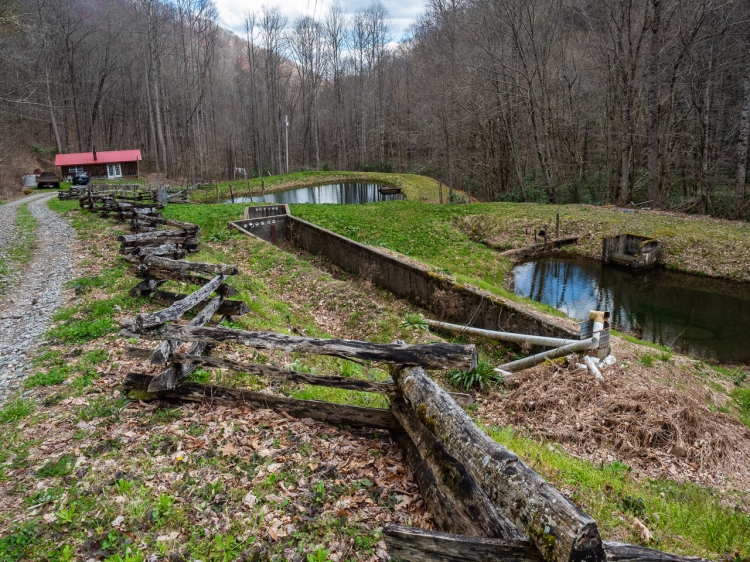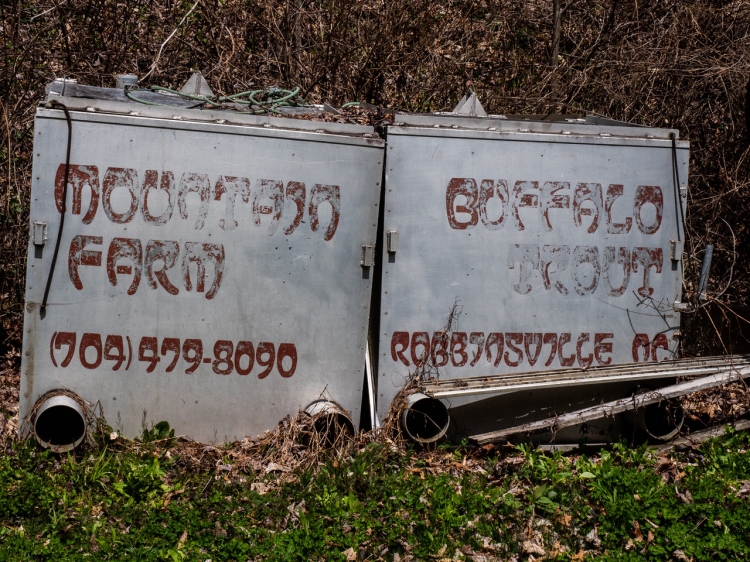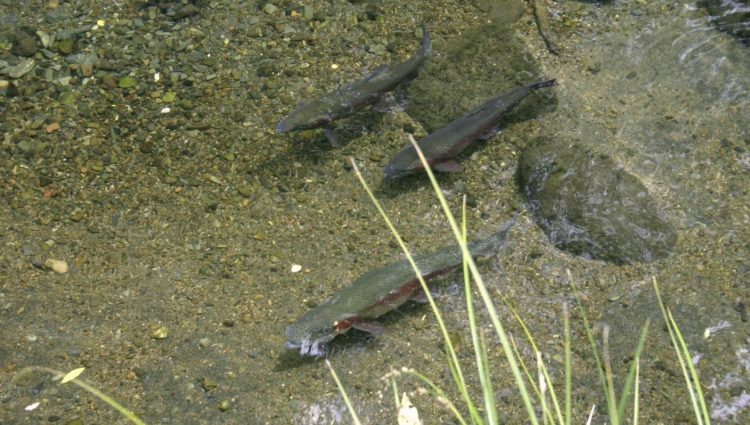The day I spotted the help wanted ad I was three years into a dead-end job relocating displaced families for the Tennessee Department of Transportation. My low-paid position was a stepping-stone to nowhere; Tennessee’s unofficial motto, as 49th in state pay, was “thank God for Mississippi.” The regional boss, a champion of mediocracy, had given me a performance evaluation of uninspiring marks straight down the middle column (no employee was perfect and all got an average rating). Worse, my life had been threatened a few times by disgruntled folks unappreciative of encroaching highway projects.
Desperate to divest from my suffocating government bonds, I interviewed for the job helping out at Buffalo Mountain Trout Farm in Graham County, North Carolina. Paul Thompson, my potential boss, concluded that a business-attired bureaucrat with a BA in psychology didn’t fit his job description. My brother-in-law, who happened to be Paul’s hunting buddy, convinced him otherwise. My salary sank to a meager $125 a week plus rent-free but rustic—or should I say rusty?—lodging.

A few weeks later, in November 1980, I was living in a battered, mouse-scented trailer planted in a wooded patch up the side of a remote canyon outside Robbinsville, North Carolina. Paul’s modest two-story log cabin sat below, between the rough dirt road that ran from the state highway up toward Hooper Bald and the stream that fed the concrete trout raceways and ponds. We were off the grid, powered only by an irregularly running diesel generator. I kept my perishables in a big Styrofoam ice chest (once used to ship fish) outside the back door, cooked on a gas stove, and used a Coleman lantern when the electric lights flickered off. A huge wood-fired Franklin stove kept the tin abode warm and toasty, despite scanty insulation. The water supply snaked down through a PVC pipe from a spring-fed 55-gallon barrel further up the hill. The toilet leaned to one side; if I dawdled on the throne for too long, my downhill leg would grow numb.
Fertilized rainbow trout eggs were shipped to the farm and held in spring-fed tanks until they hatched. One of my many tedious duties was to watch these eggs closely and siphon out any dead eggs or fungus to prevent disease from infecting the whole batch. Once the fry hatched, they were moved to a larger tank. As the trout grew, we kept them sorted by size in separate raceways/ponds to prevent cannibalism.
We fed the trout malodorous fishmeal pellets. An obstreperous ram that briefly resided in a field next to one of our ponds took a liking to the feed, and, whenever I came in to the enclosure toting a bag, he would charge as soon as I set it down, ramming the sack and gobbling up the pellets as they spilled from the gash. If I got in his way, he would butt me. I started carrying a two-by-four to fend him off until I could get the fish fed.
One day a week we would net trout out for cleaning and delivery to restaurants or markets. Paul would truck the iced fish to places in North Carolina and Tennessee, leaving me alone to tend the farm for a few days. Our biggest order during my time, from a Chattanooga grocery chain, was for hundreds of dressed trout. “Dressed” trout are not scaled, and the heads are left on: slice up the belly, grab and pull out the innards, scrunch out the blood line beneath the spine, rinse, and repeat. We started gutting and packing fish at 8 a.m. and didn’t finish until 2 a.m. the next day. I would bury a huge load of slimy entrails in the garden and swear off eating trout for good.
In addition to the fishy stuff, I cut firewood and wrangled locust posts for use around the grounds. One choice locust tree remained standing after some yellow jackets took my approach personally. Despite a record fifty-yard dash and much self-flagellation, I ended up with three painful stings. My second sin was to misjudge the physics of a leaning tree and drop it right in the middle of Paul’s herb garden. Hickory makes fine firewood, fueling a long, slow, fragrant burn, but a stack of the stuff didn’t atone for the slaughtered shoots beneath the timber. Nevertheless, theses flubs were forgiven and once Paul saw that I was a responsible, hard worker, he raised my pay to $150 a week. Unlike the local hires, I showed up on time and didn’t disappear during hunting season.
Other than an occasional interaction with a temporary worker or a brief trip into Robbinsville to get groceries, I had very little contact with the local folks. The clerks at the grocery store seemed to turn their noses up at me, perhaps because I smelled like dried anchovies, rather than from pure unfriendliness. Getting out to civilization was a trek, anyway—miles of rutted, rocky, unpaved road. I had a vintage VW bug with oversized tires that would get me in and out, although, not without cost. Twice I had to call on my dad to ship me replacement parts so I could jackleg my own repairs—replacing a starter and a gas tank.

Winter was the dicey season for a job that required frequent forays into icy ponds. The sun would not rise past our surrounding mountains until late in the morning and disappeared back behind the peaks long before dusk. I wore leaky chest waders and was showered by the flopping fish as I corralled them into a large rectangular box with a wire-mesh bottom. I had to keep debris and ice off of the outflow grates of the ponds and runways or the waterways could back up. I wore neoprene gloves, but my hands were chapped and cracked from the constant soaking and scouring. My Rube Goldberg-style plumbing system froze up often.
Paul had a lumbering Saint Bernard that only lacked the keg and ambition to be an alpine rescue dog. Later he brought in a feisty Chocolate Lab, a hunting dog prospect with a dim future. The Lab liked to retrieve any dead floaters from the pond, a useful service, except she would then proceed to roll in the rotten fish. One day the dogs tagged along on a hike I took to Hooper Bald. The shrubbery fringing the bald was rimed with ice; the wind sculpted trees were stunted and gnarled. The dogs chased down a baby raccoon and killed it. The day felt very Darwinian.
This food-chain reality was ever present. My fishy grim reaper tasks, from culling diseased eggs to choosing which trout made the dinner table, were a constant reminder that this was not Eden. Occasionally, a regal kingfisher might take a small cut of fish, but when a muskrat started digging into the pond banks, we got worried. One day, while Paul was gone, I spotted the muskrat’s beady eyes peering out from his hole. Though not a hunter, I went into Paul’s cabin and retrieved a shotgun. The next time the muskrat stuck his nose up, I dispatched him with a single shot.
Once, when Paul and I were heading back from town, we came across some hunters butchering a black bear hanging from a tree limb in their front yard. They gave Paul the liver. He invited me over to his cabin that evening to eat the mess of liver and onions his girlfriend had cooked up. I was expecting to politely choke down a gamey, gnarly internal organ. Instead, the liver, something I wasn’t usually fond of from any source, was tender and succulent.
So why was I there? I wanted solitude, time to think and sort out an aimless life. Now in my late twenties, I was four years past a rash and disastrous marriage that ended in divorce. I vowed not to waste the lessons learned. Number one was to not get hitched again until I was wise enough for the institution (that took almost twenty years). Number two was to find a job I actually liked. I had planned on getting a master’s degree in psychology, but a few years working as a psychiatric technician while I earned my BA offered a reality check. I thought Thomas Szasz’s The Myth of Mental Illness was a stretch, yet the mishmash of available therapies I saw deployed was ambiguous and the outcomes tenuous. I concluded about a third of us psych majors were trying to find ourselves, another third were on a power trip, and the rest actually had the people skills to do the job. I wasn’t in the latter category. The state job had been the best thing I could muster with an otherwise unmarketable degree.
One goal of my stay on the farm was to at least keep a journal, if not write some poetry or short stories. Five weeks in, the first words I wrote in my “journal” were Henry Thoreau’s: “It is not easy to write in a journal what interests us at any time, because to write it is not what interests us.” What little writing I did was not worth much. Instead, I memorized (minus the Dante quote in Italian) T. S. Eliot’s “The Love Song of J. Alfred Prufrock,” reciting it to myself as I worked. I can’t fully explain the appeal of this poem “Of restless nights in one-night cheap hotels / And sawdust restaurants with oyster-shells” to a trout-addled, semi-hermit dwelling in an Appalachian forest. I was mesmerized by the poem’s imagery: “evening is spread out against the sky / Like a patient etherized on a table. . . . / The yellow fog that rubs it back on the window-panes.” Yet, I think the real pull was Prufrock himself, who, like me, was spending way too much time rattling around in his own brain and too little time actually living: “time yet for a hundred indecisions. . . . / To wonder, ‘Do I dare?’”
Several poems in Edgar Lee Master’s Spoon River Anthology—life lessons from the grave—whispered to me. While Cooney Potter worked himself to death in a quest for wealth, his lackadaisical, music-loving neighbor, Fiddler Jones, ended life with “a thousand memories, / and not a single regret.” A contrast I took to heart. Yet, the Spoon River voice that stuck with me, and which I often recall to this day, especially when contemplating a major life change, was George Gray’s:
I have studied many times
The marble which was chiseled for me—
A boat with a furled sail at rest in a harbor.
In truth it pictures not my destination
But my life.
For love was offered me and I shrank from its disillusionment;
Sorrow knocked at my door, but I was afraid;
Ambition called to me, but I dreaded the chances.
Yet all the while I hungered for meaning in my life.
And now I know that we must lift the sail
And catch the winds of destiny
Wherever they drive the boat.
To put meaning in one’s life may end in madness,
But life without meaning is the torture
Of restlessness and vague desire—
It is a boat longing for the sea and yet afraid
I heeded, after ten months on the farm, George Gray’s message to lift the sail (metaphorically) and see more of the world, albeit initially in a Volkswagen, not a boat. The winds of destiny steered me to places all over the world; and eventually, with a family aboard, I grounded back in North Carolina. I may not have yet fully plumbed the meaning of life, but so far, it hasn’t ended in madness. As for Paul? He went on to chase bigger fish as a charter boat captain in Southport, North Carolina.
**Featured Image: Wild Rainbow Trout – Photographer “DB Thats-Me,” – Wikimedia

Loved this one, Jimmy! Hope to see more soon.
This is a great one! The Robbinsville area is very nice, sounds like you had an interesting, memorable time back there
Eddie and Grant – thank you for the positive reviews. As I am a fan/follower of your posts, I’m glad you both liked the piece.